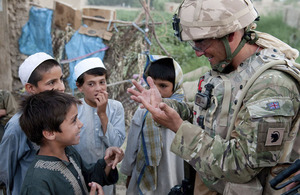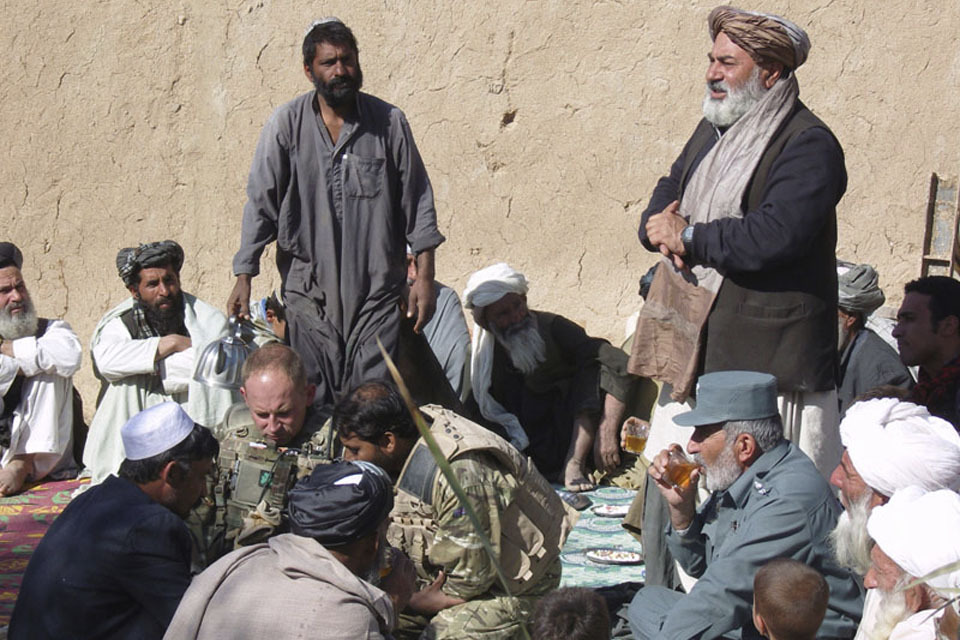The right track to irreversible progress in Afghanistan
While there had been substantial progress in 2010 in Afghanistan the gains are not irreversible and there is much to be achieved in 2011 senior British military and civilian officials said yesterday.

A British soldier chatting to Afghan children during a joint patrol with the Afghan National Police and Afghan National Civil Order Police in the Bolan area [Picture: Corporal Gary Kendall RLC, Crown Copyright/MOD 2010]
Speaking to the press in London Karen Pierce, the Foreign Secretary’s Special Representative on Afghanistan and Pakistan, and Lieutenant General James Bucknall, Deputy Commander of ISAF and UK component commander in Afghanistan, both stressed that real progress has been made in the campaign and NATO forces are confident of achieving upcoming objectives.
Karen Pierce said:
The task going into 2011 is obviously to solidify those security gains and extend them where we can so we have a real prospect of security and stability across Afghanistan that is lasting by the time we get to the end of the transition cycle in 2014.
I think as well that 2010 was notable for a better international grip on events in Afghanistan outside the military campaign and I think it was also notable for a better Afghan grip on their own governance and on their own methods and mechanisms to run a more normal country able to take more advantage of the help the international community has to offer.
Highlighting the London and Kabul Conferences as key events over the past year she said that the NATO summit was the event that set realistic expectations of the transition to Afghan security control.
Ms Peirce said:
The NATO Lisbon summit had some success I think in convincing the Afghans and the region that the 2011 date was just what we always said it was; it was a point at which some of the US surge might start to draw down but it was no more significant than that.
So the Lisbon summit had a very useful effect psychologically as well as practically in focusing people on transition and on a longer term NATO commitment to Afghanistan that will endure beyond the current ISAF mission i.e. beyond 2014, beyond 2015 and morph into much more of an enduring partnership of the sort NATO has with some of Afghanistan’s more northern neighbours and with other European countries.
On the well discussed date of July 2011 for the beginning of transition Ms Peirce said:
We are not expecting anything dramatic and I think the people who will be most shocked on 1 August 2011 will probably be some of those Taliban leaders, who had thought that July was a cataclysmic date.
Speaking via video link from Kabul, Lieutenant General Bucknall described some of the achievements and challenges faced by ISAF and Afghan National Security Forces (ANSF).
Lt Gen Bucknall said:
We believe here that we are making progress, that we are arresting the insurgent’s momentum across much of the country and that we have reversed it in some key areas. But while that progress is tangible it remains fragile and is certainly not irreversible.
We now have the right inputs for the campaign. We have got the right strategy; not only the security line of operations but also more broadly, we have got the right structures, particularly with the formation of headquarters IJC and the NATO Training Mission Afghanistan (NMT-A) and so on.
And importantly we now have the resources in place to deliver that strategy. Just as a comparison, in 2006 when I was here before, the ISAF strength was 42,000, with the Afghan National Security Forces not more than 50,000 deployed on the ground. Now ISAF totals 140,000 and the Afghan National Security Forces are at 262,000 and growing.
Lt Gen Bucknall stressed that the last forces of the US uplift arrived only at the end of October and it will take time for them to have an effect:
We have to be particularly careful to distinguish the enduring effects of the campaign from seasonal trends. For this reason it may well be early summer 2011 before we are able to show definitive evidence of our progress.
The General highlighted Kabul as the success story in the campaign so far:
The seat of government must be a key target for the insurgents and we can sometimes underplay the significance of this,” he said.
Yet the insurgents have only been able to achieve sporadic effect; with three major attacks in Kabul since July. It is not Baghdad. And this has not been for want of the insurgents trying to achieve effect.
The Afghan National Security Forces have got the security lead in the capital and the national directorate of security have been particularly successful in thwarting a number of threats seen. But I stress there has been no complacency and that threats remain.
On the training of new Afghan security forces Lt Gen Bucknall said the formation of the NATO Training Mission - Afghanistan (NTM-A) was allowing good progress to be made in growing those forces. Indeed, he said they’re estimated to be seven per cent ahead of target to achieve the currently endorsed target of 305,000:
We need to continue to focus ISAF forces in filling training billets and actually remind ourselves that developing the force in barracks and on operations is as critical to growing it in the first place.

Up to 180 village elders and locals attended District Governor Habibullah Shamalani's Outreach Shura held in Torjan [Picture: Captain Herbert UPO, Crown Copyright/MOD 2010]
On the transition of responsibility for security to those new forces Lt Gen Bucknall said:
We now have a process in place that is endorsed both by NATO and by the government of Afghanistan. We commence in 2011 and the objective is to transition key security responsibility to the government of Afghanistan by the end of December 2014. Ultimately, this process must be led by the government of Afghanistan in partnership with NATO and ISAF.
It will be a conditions based, bottom up process. It will reflect progress in the delivery of security, governance and development. As the transition progresses we should expect the campaign to become more dynamic requiring shifts in effort and focus.
As dividends occur there will be a requirement to re-invest effort elsewhere in order to maintain campaign momentum, and that will be important. Above all, it is a shift by ISAF from one security posture to another and the proper transition of Afghan security to Afghan National Security Forces.
As we go down this route we must expect, and indeed we are seeing, a greater sense of ownership by the government of Afghanistan in the conduct of the campaign, and that too is a sign of progress.
Looking to the immediate future the General said that the Afghan National Security Forces and ISAF have got to maintain momentum into the winter campaign - a time when traditionally the insurgents in certain parts of the theatre either leave or their tempo drops:
We have got to deny the insurgents the traditional safe havens which they have harboured in during the winter months,” he said.
We have got to complete the transition to hold Kandahar, we have got to deepen and sustain the hold in central Helmand and crucially we have got to link Kandahar and central Helmand along Highway 1 and in so doing we will send a strong message both to the insurgents and to the Afghan people.
Lt Gen said that we must expect 2011 to be a tough fight as ISAF and the ANSF contest the insurgents more intensively, widening the writ of the government of Afghanistan.
He concluded by saying:
Progress is not irreversible, we are yet to make it so. But we are certainly on the right track.